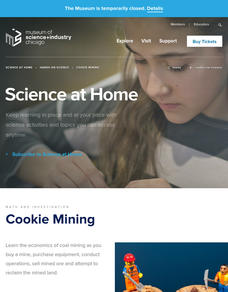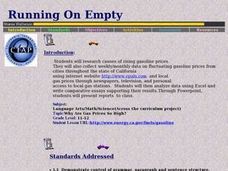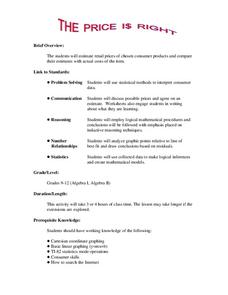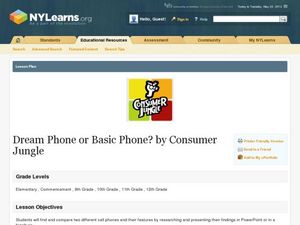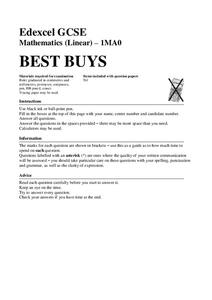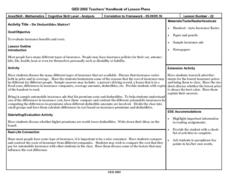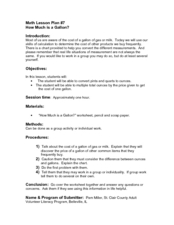Mathematics Assessment Project
T-Shirt Sale
Everyone loves a sale! As pupils investigate a sale on t-shirts, they determine the percent discount and original prices.
Yummy Math
Which is the Best Deal on Candy?
Buying enough candy for trick-or-treaters without spending a lot of money can be the ultimate Halloween trick. Middle schoolers solve two holiday-themed word problems to determine which brand of candy is the better deal, based on cost...
Museum of Science
Cookie Mining
Knock a chip off the cookie. Learners purchase a property to mine and mining tools. Pupils use their tools to mine chocolate chips out of a cookie for 5 minutes and return cookie fragments to its original site. After the time is over,...
Curated OER
Running On Empty
Students research causes of rising gasoline prices. They collect data on fluctuating gasoline prices and analyze the data using Excel. They write comparative essays supporting their results and create PowerPoint presentations to present...
Curated OER
The Price Is Right
Students create a list of products with estimated prices. In this algebra lesson plan, students learn to write equations using variables. They match their created list with that of actual products and compare their prices,
Curated OER
Sky High Fuel
In this fuel price worksheet, students examine a chart that shows fuel prices between 2001 and 2005. They compute the answers to 3 word problems in which they work with finding average. They complete an extension activity in which they...
Curated OER
Campaign Signs and Pranksters
Learners collect campaign literature and investigate what signs local candidates are using. Students contact local politicians/candidates and interview them about the concepts and creation of their campaign literature. Learners compare...
Curated OER
Dream Phone of Basic Phone?
Learning to be a savvy shopper can make or break the bank. Upper graders research five different cell phone carriers to see if they'll have enough money in their imaginary budget for a dream phone or a basic phone. They create either a...
Curated OER
Filling Up-Gasoline
In this fuel sources worksheet, young scholars calculate the E85 alternative fuel costs per gallon compared to the cost of gasoline. Students complete a table to show the comparison prices. They create a triple line graph to show the...
Mathed Up!
Best Buys
Which scenario is the better deal? Class members examine nine scenarios to determine which choice offers a better deal. Pupils decide whether they need to find unit costs or total prices to compare the two options.
Virginia Department of Education
How Much is that Tune?
Tune in for savings! Scholars investigate pricing schemes for two different online music download sites. After comparing the two, they determine the numbers of songs for which each site would be cheaper.
Curated OER
Market Basics: Demand, Supply, and Price Determination
Students are introduced to the concepts of supply and demand. Using the Law of Demand and Supply, they develop charts and graphic models of supply and demand. They compare and contrast the behavior of consumers and suppliers when there...
Curated OER
Introducing the Concept: Rates
Sixth graders explore rates as a specific type of ratio, using visual examples of unit rates and unit prices to increase comprehension. They also practice solving problems that are modeled by the instructor. The well-scripted...
Curated OER
Do Deductibles Matter?
Fifth graders discuss insurance and the cost of automobile insurance. They compare and contrast the costs of insurance from different companies. They figure the savings from the lowest deductible to the highest deductible.
Curated OER
Endangered Species
Ninth graders graph data in order to compare the number of extinct species and a rise in human population. They analyze the data collected. Students are encouraged to infer the relationship.
Curated OER
Inside the Vault-Entrepreneurship
Young scholars explore entrepreneurship. For this economic study lesson, students take a pretest on attitudes, review characteristics that make up an entrepreneur, review a list of famous entrepreneurs, and create a 5 minute oral...
Curated OER
Christmas Shopping on the Internet
Students utilize the Internet as a research tool as they "shop" on the Internet for a list of Christmas gifts. In groups, they compare prices, shop for the best price and make sure to spend no more than $300.
Yummy Math
Valentine’s Day = Roses
Roses are red, but did you know that some are lighter while others are darker? Scholars read an infographic to decipher the fraction and percent of rose color and their country of origin. They go on to make comparisons and estimate while...
Curated OER
Working with Percentages
Students complete basic operations using percentages in a variety of real world situations. Discounts are computed and compared to a variety of prices listed in local newspaper advertisements.
Curated OER
How Much Is A Gallon?
By engaging in real life examples, learners practice measurement and conversion skills. They review a chart comparing pints, quarts, and gallons. Then, they complete a worksheet involving prices per unit. For example, they calculate how...
Curated OER
ESOL COnsumer Education
Students discuss the importance of saving money by shopping sales and reading advertisements. They share personal practices with comparison
shopping to save money then complet "Shopping" activity.
Curated OER
A Functional Housing Market
Students access the Internet to search for housing prices in Houston, Texas,(the location can be changed to accommodate any location) and compare the prices to the number of square feet found in the living area of a house.
Curated OER
Filling Up
In this filling up worksheet, students calculate the E85 per gasoline-gallon equivalent price to the E85 price per gallon to complete a chart of "alternative fuel". They use the data along with the price per gallon of gasoline to plot...
Curated OER
Leveled Problem Solving: Histograms
In this using data, frequency table, and histogram to solve word problems activity, learners solve problems about prices of toys and numbers of toys sold to solve consumer mathematics problems. Students solve six problems.




